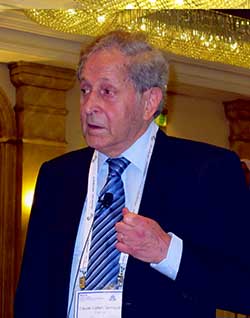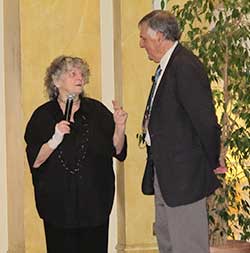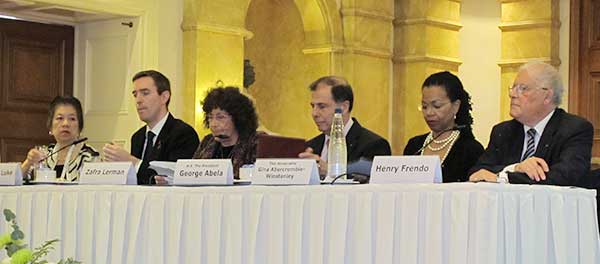The Malta Conferences
Frontiers of Science: Research and Education in the Middle East
Morton Hoffman and Zafra Lerman
Political instability and social incivility, coupled with water scarcity, threats of nuclear proliferation, and a need for energy that is outstripping the sources has made the Middle East a very dangerous region of the world. Nations are in declared and undeclared states of war with each other and themselves, and expressions of hatred and, at best, animosity are proclaimed daily. Yet, within these nations, there are people who do the work of science and science education at universities and national institutes, and hunger to know their colleagues from across the forbidden borders and to learn about the results of their research.
In order to facilitate contacts and collaborations among these scientists and educators, biennial “Malta Conferences” (so-named because of the location of the first two meetings in 2003 and 2005 on that Mediterranean island) have been held over the past 10 years for the purpose of using science diplomacy as a bridge toward peace in the Middle East. Recent conferences were held in Istanbul in 2007, in Amman, Jordan, in 2009, in Paris in 2011 at UNESCO headquarters as part of the celebration of the International Year of Chemistry, and on Malta at the Hilton Hotel on November 10-15, 2013 (Malta-VI).
These conferences, which are organized by the Malta Conferences Foundation (MCF), a 501(c)(3) charitable organization, feature plenary lectures by Nobel Laureates, workshops on topics of importance to scientists and educators from the region, oral and poster presentations by participants from the Middle East, and ample time for everyone to make personal and professional connections. At Malta-VI, a total of 80 invited participants, including students and early-career scientists, attended from 15 Middle Eastern countries (Bahrain, Egypt, Iran, Iraq, Israel, Jordan, Kuwait, Lebanon, Libya, Palestinian Authority, Qatar, Saudi Arabia, Syria, Turkey, and the United Arab Emirates); 15 invitees were unable to come to Malta, a member of the European Union, because of visa problems.
The plenary lectures were given by the following Nobel Laureates: Yuan T. Lee (Taiwan; Chemistry, 1986), Return to Nature, Back to Sunshine; Ada Yonath (Israel; Chemistry, 2009), Mid-East Regional Collaborations for Investigating Cellular Molecular Machines; Dan Shechtman (Israel; Chemistry, 2011), Quasi-Periodic Materials – A Paradigm Shift in Crystallography; Claude Cohen-Tannoudji (France; Physics, 1997), Atoms and Light; Roald Hoffmann (U.S.; Chemistry, 1981), Protochemistries Are the Bridge. Presentations were also made by Yvonne Pope (Chemical Abstracts Services, U.K.), SciFinder – The Choice for Chemistry Research; Monique Beaudoin (U.S. Office of Naval Research Global, London), ONRG’s International Research Grants and Research Support Grants; and Mustafa Al-Ammar (Earth Ambassador for the Protection of the Planet and Preservation of Peace), Sustainable Peace and Youth Leadership, who also performed a number of Iraqi songs and ballads.
Greetings were offered at the opening ceremony by Zafra Lerman (President, MCF), George Abela (President, The Republic of Malta), Gina Abercrombie-Winstanley (U.S. Ambassador to Malta), Rob Luke (British High Commissioner to Malta), Henry Frendo (President, Malta National Commission for UNESCO), who read a message from Irina Bokova, the Director General of UNESCO, and Marinda Wu (President, American Chemical Society). The opening address on “Science for Peace” by HRH Princess Sumaya Bint El Hassan (President, Royal Scientific Society of Jordan), who was unable to attend because of illness, was read by a member of the Jordanian delegation. Evening receptions were held during the week at the residences of Ambassador Abercrombie-Winstanley and High Commissioner Luke.
The following workshops, which were chaired by the listed organizers, were held:- Chemistry and Bio-Medicinal Chemistry: Cathy Costello (U.S.), Masoud Mehrgardi (Iran), Mohammed El-Khateeb (Jordan)
- Analytical, Nanotechnology, and Material Science: Khalid Al-Saad (Qatar), Essam Al-Jumaily (Iraq), Ossama Assad (Israel)
- Energy, Environment, Air and Water Quality: Chuck Kolb (U.S.), Yehuda Shevah (Israel), Tareq Abu Hamed (Israel), Alfred Abed Rabbo (Palestinian Authority)
- Chemistry Safety and Security: Leiv Sydnes (Norway), Nadia Kandile (Egypt), Saeed Al-Alawi (Bahrain)
- Science Education at All Levels: Howard Alper (Canada), Rachel Mamlok-Naaman (Israel), Boshra Mossaad Awad (Egypt)
A total of 44 oral presentations were made during the workshop sessions; 25 posters were on display throughout the entire meeting. At the end of the conference, the workshop organizers provided summaries of the talks in their sessions, many of which were quite provocative and stimulating, and the vigorous discussions that ensued. Proposals were presented for future actions, including the continuation of existing collaborations and the development of new ones, the dissemination of the information from the workshops to a broader audience, and the search for funding to provide research and international exchange opportunities for students and faculty. In the closing session, the participants, many of whom had attended previous Malta Conferences, enthusiastically endorsed the motion that Malta-VII be held in 2015.
The members of the MCF Board of Directors who attended Malta-VI were Zafra Lerman (President, U.S.), Morton Hoffman (Treasurer, U.S.), Iona Black (Secretary, U.S.), Catherine Costello (U.S.), Charles Kolb (U.S.), Stanley Langer (U.K.), Leiv Sydnes (Norway), and Howard Alper (Canada).
The following organizations were co-sponsors of Malta-VI:- Organization for the Prohibition of Chemical Weapons (OPCW): Recipient of the 2013 Nobel Prize for Peace
- Google Inc.
- United Nations Educational, Scientific and Cultural Organization (UNESCO)
- Committee of Concerned Scientists (CCS)
- American Chemical Society (ACS)
- American Physical Society (APS)
- American Association for the Advancement of Science (AAAS)
More information about the MCF and the Malta Conferences can be found at http://maltaconferencesfoundation.org/
LEFT: Physics Nobelist Claude Cohen-Tannoudji (France), giving his plenary lecture on "Atoms and Light."
RIGHT: Israeli Chemistry Nobel Laureates in conversation: Ada Yonath (Weizmann Institute of Science), at left, and Dan Shechtman (Technion).
The distinguished guests: (L to R) Marinda Wu (President, American Chemical Society), Rob Luke (British High Commissioner to Malta), Zafra Lerman (President, Malta Conferences Foundation), George Abela (President, The Republic of Malta), Gina Abercrombie-Winstanley (U.S. Ambassador to Malta), Henry Frendo (President, Malta National Commission for UNESCO).
Zafra Lerman is President and Morton Hoffman is Treasurer of the Malta Conferences Foundation.
Disclaimer - The articles and opinion pieces found in this issue of the APS Forum on International Physics Newsletter are not peer refereed and represent solely the views of the authors and not necessarily the views of the APS.



